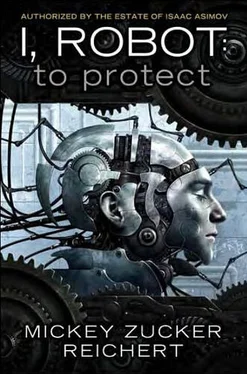“What percentage hijack buses?”
Susan shook her head. “I couldn’t give you an exact figure, but I’m sure it’s less than one in a million. On the other hand, nearly all unmedicated schizophrenics act irrationally, and quite a few are prone to violence.”
“Was this man?”
“Schizophrenic?”
“Prone to violence.”
Susan knew the answer. “Not according to his medical history, no.” She sighed deeply. That had her flummoxed as well. “From what I know from the medical literature, and what I’ve read from the Net, schizophrenics who kill usually have a pattern: poor school performance, a cruel streak that starts even before the illness, compulsions to kill, and hallucinations of murder or voices commanding them to kill.” She shook her head. “Schizophrenic killings are rarely premeditated, either. They’re more likely to whirl around on a crowded street to strangle the woman they believe is beaming radio waves into their brain. Or run over a neighbor they’re convinced puts thought-controlling poisons into their morning coffee. Schizophrenic murders are not thought out, at least not in the traditional manner. They’re usually impulsive acts tied to personal delusions.”
“So masterminding a hijacking and bombing . . . ?”
“Is unexpected, yes.” Susan said. “I was scared on the bus; I knew we might all die. But I don’t think my subconscious ever really accepted it. A fanatic with a bomb would have frightened me to the core, but a schizophrenic?” She shook her head. “Much more likely, he got a wild hair, snatched up a coil of wire and a garage door opener, then convinced himself he had a bomb.”
“Except that he had a real bomb.”
“Yes.”
“Where do you suppose he got it? Did he have the knowledge and wherewithal to make it himself?”
Susan paused to think about it. “That’s a great question, Dad. I imagine the police are asking the same thing.” She considered longer. “According to his mother, he had a brilliant mind prior to his illness, which means he might understand a schematic. On the other hand, he was a prelaw student. That’s not usually the realm of the bomb-building types. They’re usually more math and science oriented.” She shook her head. “He had never shown an interest in such things before. On his medications, I don’t believe he would have any desire to build a bomb. Off them, I don’t think he would have the concentration or focus.”
John Calvin’s face returned to normal, but he rubbed his chin with a thumbnail, clearly deep in thought himself. “So, in your professional opinion, someone gave him this bomb.”
Susan had not considered it before, but it made sense. “I don’t think he could have built it himself, and it’s not like you can go to the downtown bomb store and purchase two or three.” She raised her knees under the covers and drew them up to her neck. “Paranoid schizophrenics aren’t known to be good judges of character. If he tried to hire someone to make it, he probably would have gone to someone perfectly innocent, someone who, in his mentally ill mind, could construct such a thing. I doubt whoever he asked wouldn’t have reported it to someone: family, his doctor, the police.”
“So, it’s more likely someone recruited him. Gave him the bomb, showed him how to use it, and talked him into doing it.”
Susan nodded. “Yeah.”
John Calvin made a thoughtful noise.
“Do you think we should take our ideas to the police?”
“I don’t think that’s necessary.” John studied his daughter. “You told them about him, didn’t you?”
Susan raised and lowered one shoulder. “I gave them his name, told them I’m a psychiatry resident, and mentioned I knew him from the hospital. I didn’t tell them his diagnosis, though. I could get in trouble for violating confidentiality.” She repeated the movement. “Potentially, I could get in trouble for telling you.” She doubted that would happen. Once the media got hold of Payton’s name, every outlet would be blasting his diagnosis. Discussion groups would form, demanding to know why no one had recognized his illness, why he was not admitted to a hospital for treatment, why his doctors were to blame. Fingers would point in all directions. Then some new scandal would rock the city, and Payton’s actions would be forgotten. Nothing would change; nothing ever seemed to change.
Once upon a time, people with serious psychiatric illnesses spent their days in facilities that could handle them, in a controlled and exquisitely structured environment. Their relatives visited them on a schedule that suited their individual needs. The patient with psychosis could live in a world that made sense to him, where his delusions could be safely indulged, where he could find some comfortable form of logic and security.
Then, in the 1970s, some good-hearted people decided it was cruel to keep people in asylums all their lives. It did not all turn out badly. As medical science advanced, the needs of those with emotional difficulties and neuroses, those with milder psychoses treatable with psychotherapy, with surgery, with ever-improving medications, thrived in their new and open environment.
But, for some, their psychoses remained incurable; and their needs were vastly different. They had functioned better within the confines of an institution, had relied on the structure and predictable routine for even a semblance of normalcy. For those patients with lifelong, severe psychiatric disorders, the outside world was a dark and dangerous place. And so, they lashed out on occasion, leaving murder and mayhem in their wakes, or became crime victims themselves, or lived and died in grimy squalid conditions on the streets.
Doctors could hold patients only if they could prove imminent homicidal or suicidal intent, and then only for a maximum of two weeks’ time. It required a perceptive psychiatrist with the luck of seeing his patient just before he committed a criminal act, as well as an honest patient in strong enough mind to admit his nefarious plans.
“Did you mention the nanorobots?” her father asked, not quite casually enough.
Susan groaned. “ Et tu , Father?”
John Calvin looked at her curiously.
“I just got off Vox with Goldman and Peters. They wanted to make sure I didn’t say anything about their study. Their concern is, if word got out, it would torpedo their research and set robotics back another century.”
Susan expected her father to react more than he did. “They’re right about that, Susan. Antirobot prejudice has held the field back more than any other. We have capabilities far beyond what we’re using, and we’re stuck in beta-testing land for most of them. We can access entertainment anytime, anywhere. There’s a whole world of information at the touch of a Vox. But when it comes to robotics, the Jetsons have made more progress than we have.”
Susan chuckled. “I know you’re right. I’ve met Nate.” A sudden thought derailed the conversation. “Dad, it’s after ten on a Tuesday. Shouldn’t you be at work?”
John Calvin flopped a leg across Susan’s bed. “The explosion happened pretty close to the building. There was some minor structural damage. I’ve got the rest of the week off.”
The explanation gripped Susan in a way it should not have. Something bothered her about it. A flash of memory returned, a man blocking her way into the building and warning her to stop working on the project. She dropped her knees to the bed. “Dad, do you think that might have been deliberate?”
“What?”
“That someone recruited a paranoid schizophrenic with nanorobots in his brain to blow up U.S. Robots and Mechanical Men?”
A light flickered through John Calvin’s eyes, then disappeared. “Who would know enough about the project to do that?”
Читать дальше












